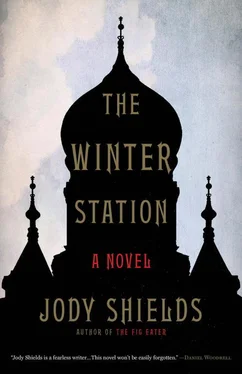Khorvat mimed a look of astonishment. “Who would do such a thing?”
“I was hoping you’d have an official answer.”
“Blame a depraved anarchist. A Bolshevik revolutionary.”
“At least one of the dead men was Chinese. A Bolshevik wouldn’t kill a Chinese. They hate Russian officials and aristocrats.”
“Perhaps it was a duel. A Chinese feud.”
The Baron persisted. “A killing on the city’s richest street?”
“The bottle, please.”
“General, I don’t know who’s guilty. I cannot even guess at a suspect. But strangely, all the dead disappeared. No bodies were received at the Russian hospital. No death certificates were filed, since I was never notified. My wife spoke to the abbot at the Buddhist temple. He confirmed there had been no recent funerals.”
“Perhaps the dead Chinese had converted to Christianity? God rest their souls.”
“There were no funerals for any Chinese at St. Sophia or St. Nikolas Cathedral. Or at Dormition of the Theotokos. No burial services at Uspenski or the Jewish cemetery. Or the mosque in Pristan. No coffins were received at the CER shipping facility. And we know Kharbin has no morgue.” He flushed at his audacity.
Khorvat’s eyes, the opaque blue of enamel in an icon, slowly focused. “Perhaps the bodies are a plot to upset the situation here. The Chinese and Japanese want to drive us from Manchuria. We’re outnumbered. You remember the riots a few years ago? Chinese workers found bones near the tracks and claimed the Russians had made a human sacrifice. Merciful God, they believe no act is too barbaric for Russians. Dr. Nikolaeva dissected a huge bear carcass in front of an angry crowd just to prove the bones were animal bones. His hands shook as he held up the bear’s bloody leg bone next to the dirty bone they’d found. Identical. Bone to bone. The public dissection was necessary to prevent a riot.”
“Autopsies aren’t for the fragile.” The Baron sipped at his glass of beryozovitsa, allowing its thickness to coat his teeth and tongue. It calmed him. “I wasn’t informed about the dead men. If someone is trying to discredit me as chief medical officer, I want to be prepared to defend myself. I’ve served you and the czar honorably.” He was sweating in his wool jacket and pulled at his collar. “The Chinese believe that a body left at a building puts a curse on it. Central Station. Churin’s store.”
“You’ve told me nothing that I don’t know.” Khorvat’s patience had thinned. “You weren’t consulted about the deaths because they didn’t seem important. No slight to your professionalism. But it’s better to avoid these conflicts. Don’t make your sympathies too obvious. I remember your struggle with your young wife and the church authorities. A man must guard his reputation. Even in this place.”
The Baron nodded to show that he understood.
Khorvat folded his hands atop the table and met the Baron’s eyes, a sign of greater-than-usual engagement. “Now. There’s been another unexplained death. A merchant.”
“Russian?”
Only the unexplained death of a Russian would be investigated. “Dmitry Vasilevich. God rest his soul. A soybean dealer. He’d just returned on the train from Mukden or Kaiyuang. His daughter, Sonya, has made wild accusations about who is responsible for his death. Blames her stepmother. The man died suddenly, probably apoplexy or brain fever. You should confirm this.”
“When did he die?”
“Two days ago.”
“And the body?”
“At rest in St. Nikolas cemetery. You will interview Sonya Vasilevna.”
“I understand.” The request was routine. He would create words to grace a paper and then seal them in a file.
“Good. Your answer will greatly comfort the daughter. I’ve also ordered a search for Dmitry Vasilevich’s widow.”
“Missing?”
“Perhaps fled. You’re a doctor. Remember why I value your work. I don’t value you as a cataloger of the dead.” A flicker as their eyes measured each other.
The Baron was relieved Khorvat hadn’t directly threatened him but only waved a flag of warning over the death of Dmitry Vasilevich. He rolled the bottom edge of his glass on the table, noiselessly crushing the scattered red petals against the white tablecloth.
* * *
The Baron had a calligraphy lesson each week with Zhang Boying, who had introduced himself as Xiansheng, Elder Born, a traditional title honoring his advanced enlightenment as an older gentleman and scholar. A reserved man, deliberate with his gestures, Xiansheng entered the Baron’s study with the gentle stir of his robes, always plum, indigo, or dove gray, the colors of the elderly. In warm weather, he wore slippers of woven grass, and boots of Russian leather were his only concession to the severe Manchurian cold. The lessons were a ritual of courtesy and reflection, preceded by an exchange of bows and tea drinking. After the lesson, the Baron presented a sealed envelope to his teacher with a bow, holding it in both hands. Money must never be visible.
Before the calligraphy lesson, the Baron had accompanied Xiansheng to a stationery shop, a quiet space with walls of narrow shelves and an unidentifiable subtle odor, clean as water. The proprietor deftly slipped a piece of paper from a shelf, its flat surface reflecting light from the open door, a brief brightness that flashed like a wing in the room. They were shown papers flecked with mica, rose-pink and yellow-gold leaf, silk paper so fine that it became a transparent shadow when laid on the table. To gauge texture and strength, Xiansheng gently pressed his thumb against the papers, brushed them with careful fingertips and the side of his hand. It reminded the Baron of the way Chinese doctors used touch to diagnose a patient.
For the first lesson, the Baron had been instructed to close his eyes and listen to his teacher demonstrate calligraphy using different brushes. “Do not listen with the ears but with the mind,” Xiansheng instructed, quoting a master. His brush moved in short sweeps, curves, straight lines, slashes, rough jagged shapes, dots. Each movement had an individual sound. One brush slightly resisted the paper, its bristles dry as whiskers, and another had a nearly silent silky glide. He was hypnotized by the soft rhythm of Xiansheng’s work, the suspense until the final stroke, a horizontal line drawn unhesitatingly from left to right. When he opened his eyes, the Baron was astonished that the images on the paper did not match what he had blindly imagined.
The Baron was given a three-layered wolf-fur brush to create small strokes and dots. His posture was corrected, and his neck muscles tightened with tension. His hand trembled. He could wield a scalpel with delicacy but the brush was a clumsy twig in his hand. He struggled, powerless to control his movement, to calm himself.
Teacher told him to stop. “You must consider the brush in a different way. Release the brush.”
“Put it down?”
“No. Release the brush while you hold the brush.”
The Baron was confused, uncertain if his teacher was joking or if he’d misunderstood. Xiansheng was implacable. He instructed the Baron to sit with the brush for half an hour. It took fifteen minutes for his anger to subside. His teacher then read one of the principles of calligraphy that had been set down in the seventh century by a master Taoist calligraphist, Yu Shi’nan: “‘If his mind is not tranquil, the writing will not be straight.’”
Xiansheng’s expression was usually neutral, but occasionally the Baron caught a hint of the man’s approval. Or perhaps this was just what he craved. During a lesson, he learned the character ming , for “brilliance,” which merged the individual characters for sun and moon . Astonished by the beautiful simplicity of this word picture, he sought his teacher’s eyes, stricken by the realization that he would never master this language. At that moment, Xiansheng’s eyes shone with compassion.
Читать дальше











